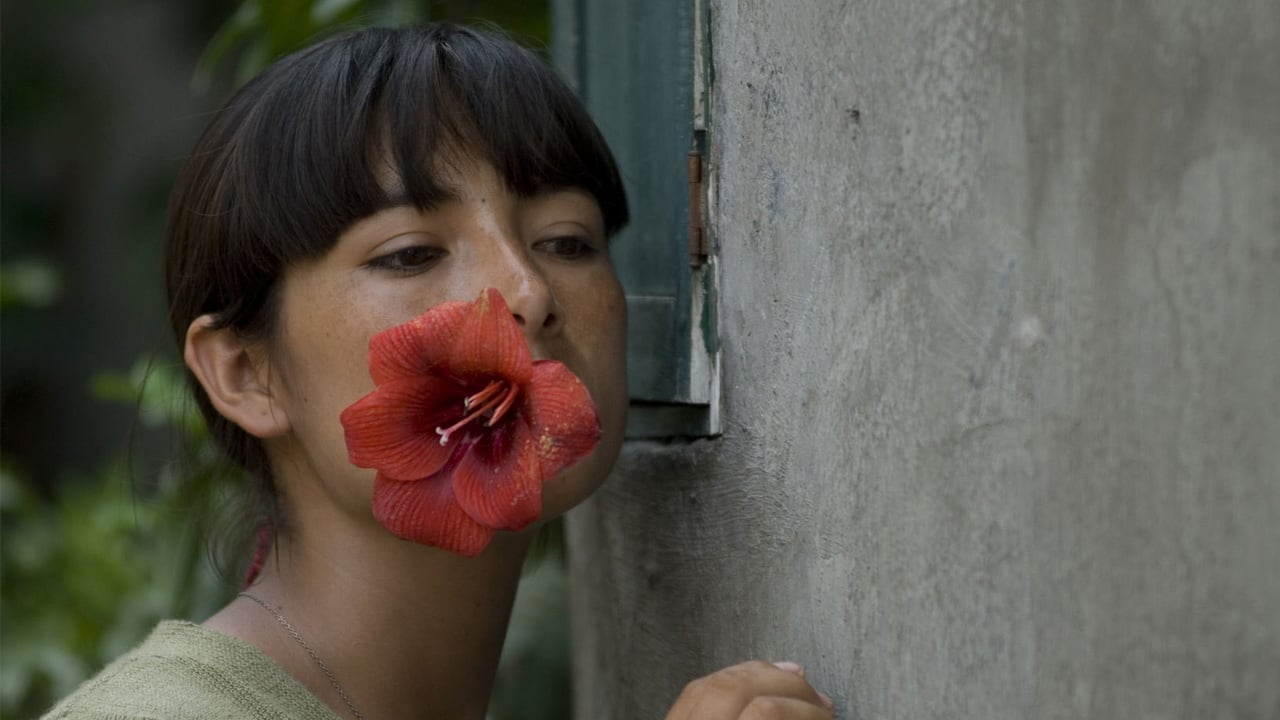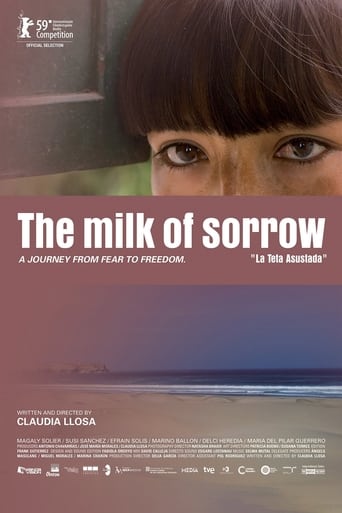

Purely Joyful Movie!
... View Moreif their story seems completely bonkers, almost like a feverish work of fiction, you ain't heard nothing yet.
... View MoreThrough painfully honest and emotional moments, the movie becomes irresistibly relatable
... View MoreStrong acting helps the film overcome an uncertain premise and create characters that hold our attention absolutely.
... View MoreAfter seeing the movie "The Milk of Sorrow" by Peruvian filmmaker Claudia Llosa. I have the opinion that it is a story of fear provoked by popular beliefs in Peru, because some women in the Shining Path Era, a Guerrilla group of the eighties that it emerged in Peru, they were raped and mistreated and had children marked by this fear. Fausta is a young woman marked and judged by society since she is the daughter of a rape and her mother was responsible for transmitting this fear with popular beliefs such as the frightened tit, "milk of sorrow", which is transmitted by mothers to their mothers. babies. You can also clearly see the social racism in this movie. After the death of Fausta's mother, she needs to get money to be able to bury her mother in her homeland, that's when she gets a job in a house of high social class where the owner takes advantage of her shyness and lack of education by stealing a song that uses it as theirs. Fausta confronts her fears in that house and confronts them when she meets the gardener of the house, speaks with her own language that is Quechua, she feels very good with him. Fausta's strength is imposed on the pain and fear in which he lived in that society, he manages to remove the potato he had in his body, which caused him discomfort. She manages to bury her mother but first she goes through the sea that signals the new life that awaits her later, a hope of a new life for Fausta, without fears, without pain. The film also shows violence against women that leaves them soulless and very afraid.
... View MoreLa teta asustada is not, quite understandably, everyone's cup of tea. It is a slow, pensive, drawn-out film that almost feels like an ominous daydream. There is much that goes unsaid, and if you are not familiar with the Sendero Luminoso insurgency in Peru and the enormous amount of political violence perpetrated by both rebel and government forces, the underlying forces driving the film will not make that much sense. This is particularly the case with the rather disturbing opening scene and the graphic account of the rape of the protagonist's (Fausta) mother. There are also dynamics of class, gender, language, and race at work in this film, and the interplay between them is best understood with some prior knowledge of Peru, or Latin America more generally. The opening scene and the revelation that Fausta has placed a potato in her vagina to protect her from rape would be enough to turn many people off from the beginning of the film, and for good reason. Yet this film, to its credit, in my view, refuses to be anything other than what it is – an exploration of the legacy of trauma and fear of the Sendero Luminoso insurgency and the violence that came along with it. I enjoyed this film, but I appreciate films that are slow, melancholy, and leave plenty of time for pondering. It is not necessarily a feel-good movie, but felt more like a gloomy, ambiguous French film. It had more sad moments than happy ones, although that is only fitting of a film with such a dark topic at its heart. Yet there was something bizarrely hopeful about the film, and regardless of how bad Fausta's situation may have seemed, she showed admirable courage, and a faint light does appear at the end of the tunnel.
... View MoreFausta's aged mother passes away, singing a song that tells of horrific suffering in the not-so-distant past. That suffering has been passed on to her daughter through, according to local folklore, her mother's breast milk. With a potato inserted in her vagina, Fausta hopes to ward off the ugly indignities inflicted on her mother. Fausta's poverty, both material and spiritual, is thrown into sharp relief when she gets work as a housekeeper at the home of a wealthy and celebrated, but arid musician. The musician draws Fausta's song from her. And so, she begins to sing. This is a slow-burn film that offers startling images at time, and is strongest in its representation of the rituals of courtship, marriage and death. There is a rhythm and intensity to these scenes, a beguiling charm, that is disarming. Less successful are the long takes of Fausta (Magaly Solier) staring off into space when in the throes of her existential plight. The film goes after an imagistic rather than narrative experience and only partly succeeds. A dense film, in fact impenetrable at times, it offers strong symbolism, gritty ethnographic authenticity, but ultimately demands patience that it fails to completely reward, Magaly Solier's intensity failing to compensate for the plodding pace.
... View MoreClaudia Llosa writes a peculiar, but captivating story of a young Peruvian girl living in a constant world of fear on the outskirts of Lima. Fausta is believed to be suffering from a rare disease, "La teta asustada," or the "Milk of Sorrow," which was transmitted from her mother's breast milk after she was raped by terrorists during the time of Sendero Luminoso. Facing her mother's death, Fausta is forced to overcome her fear and work in the Big House of a limeña musician. While both the music and filming are stunning, I feel that the film lacks much action or thick plot. I found it to be more of a journey, one that led Fausta from her fear to a glimpse of her freedom. Furthermore, as a viewer who has lived in Peru, the film was very nostalgic for me and I felt that it portrayed Lima and the "pueblos" with a profound sincerity. If you are looking for a poetic and beautiful journey of a story, this film is exactly that.
... View More